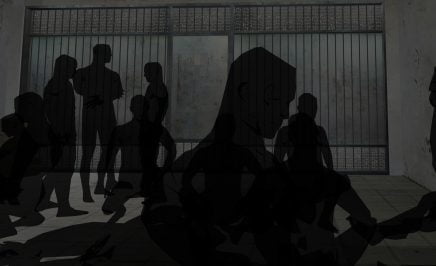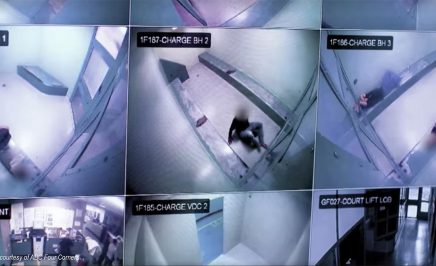New draconian amendments in the name of counter-terrorism are another nail in the coffin of fair trial standards in Egypt.
A set of legislative amendments approved by the Egyptian parliament will give the authorities sweeping powers to carry out mass arbitrary arrests, enable indefinite detention without charge or trial and will severely undermine due process and fair trial guarantees.
The amendments came after the deadly bombings of three churches in Egypt during the Palm Sunday services on 9 April that left 44 dead and more than 100 injured.
This was the ninth attack on Coptic Christians in Egypt in four months that once again highlighted the failure of the state to protect the Coptic minority.
Instead of reviewing the security failures that led to the attacks on Coptic churches and the legacy of systemic discrimination against Copts, the authorities used the bombings as a pretext to declare a state of emergency for three months and push through a set of repressive legislative amendments. The proposed amendments do not address the root causes of sectarian attacks but further break down the checks and balances in the criminal justice system and increase the authorities’ iron grip on freedoms and peaceful dissent.
On 10 April 2017, the Egyptian parliament approved a new set of repressive amendments to several laws including the Code of Criminal Procedure (Law no. 150 of 1950); law no. 57 of 1959 regulating appeals before the Court of Cassation; Law no. 8 of 2015 on “Terrorist Entities and Terrorists” and Counter-Terrorism law no. 94 of 2015. The amendments were proposed by MP Salah Hassab-allah deputy head of al-Mo’tamar party and others.The parliament discussed and approved it in one day and sent it to the State Council for review and advisory opinion on 12 April 2017.
On the same day, MP Tharwat Bekhit introduced new amendments to the Emergency Law No. 162 of 1958 which were approved by the parliament and sent to the State Council on 11 April 2017. As per the Constitution, the State Council will now review the legality and constitutionality of all the amendments and return it to the parliament with recommendations for further amendment. At this stage, the parliament usually approves the revised draft legislations and sends it to the President for his sign off.
If adopted, the proposed amendments pose a major threat to the rights to liberty and security of person, to fair trial, and to freedom of expression and association and will continue to do so long after the current state of emergency. These amendments will give special emergency courts the power to detain people indefinitely; empower security forces to arrest anyone that they suspect intends to commit an offence, and to search their homes without the need to obtain a judicial warrant. The amendments give the courts the discretion not to hear any of the defense witnesses; abolish the right to re-retrial and second appeal before the Court of Cassation, paving the way for mass death sentences and executions.
Further, they allow criminal courts to list people and entities on terrorism lists based solely on police information; and detain people for up to seven days without being brought before a judge or prosecutor, which will facilitate enforced disappearances.
Amendments to the Emergency law on the power to arrest and detain
In 2013, the Egyptian Constitutional Court had struck down the Emergency Law provision allowing for administrative detention, which had been used under former president Hosni Mubarak to imprison at least 18,000 people for up to ten years.
For over three years, parliament failed to amend the law in light of this decision but last week approved a new article (3bis) that allows the police to arrest and detain people “on suspicion of planning to commit or having committed an offence for seven days” without being brought before a judge or prosecutor. Given past experience and patterns of abuse, it is very likely that the new provision will enable security forces to carry out mass arrests, subject people to enforced disappearances and torture, and detain people, including peaceful critics of the government, without probable cause.
Under the regular law of criminal procedures, prosecutors can order detention for four days, renewable by 15 and later 45 days, under a set of conditions related to the conduct of their investigations.
Most worryingly, a second provision, 3bis(a) states that after the initial seven days without charge, the prosecutor can request that the Emergency State Security Courts order a 30 day detention, subject to indefinite renewals, for anyone considered a threat to security. Emergency State Security Courts during the Mubarak era were notorious for their lack of due process.
The proposed changes would also give the authorities the powers to search a suspect’s home, or any other place that the authorities suspect s/he could be hiding evidence of committing an offence or hiding explosives, weapons or any other dangerous materials and without the need to obtain a judicial warrant.
Amnesty International fears that the proposed amendments will give the security services carte blanche, in the name of combatting terrorism, to carry out arbitrary arrests, enforced disappearance and torture on a mass scale.
Amnesty International fears that the proposed amendments will give the security services carte blanche, in the name of combatting terrorism, to carry out arbitrary arrests, enforced disappearance and torture on a mass scale. Since president Abd el-Fattah al-Sisi came to power, at least 34,000 people, according to the government’s own figures, have been arrested and held behind bars; courts have handed down mass death sentences after grossly unfair trials and based on only police investigations and testimonies of police officers and government officials; hundreds more were held under conditions of enforced disappearance and tortured and otherwise ill-treated to extract “confessions” to obtain convictions at trials.
In a development that is possibly even more worrying, the parliament also approved a new set of amendments to ordinary laws that apply outside states of emergencies.
Amendments limiting defence rights under the Code of Criminal Procedures
Amendments to the Code of Criminal Procedures will severely undermine the presumption of innocence, right to defence, and severely undermine fair trial standards.
The proposed amendment to Article 277 gives courts the power to ignore or refuse to hear all or some witnesses for the defence.
This provision will severely undermine the right to defence and the presumption of innocence especially since the Egyptian criminal justice system has an appalling record in relying only on police or government witnesses to convict and sentence hundreds in mass trials.
Amendments to article 384 and 395 of the Code of Criminal Procedures do away with the requirement that the defendant or his lawyer be present in court when a verdict is issued.
This is contrary to international fair trial standards that require the defendant to be physically present during the trial to consider the verdict issued in his presence. It undermines the right to retrial before the same court at the same stage of litigation and the defence rights to examine evidence and respond to the prosecution’s claims.
The new amendments would also abolish Article 388 of the code of criminal procedure which grants those sentenced in absentia a retrial before the same court at the same stage of litigation, even if their delegates had attended the trial to present the reason why the defendant was not able to attend the trial.
Limiting appeals before the Court of Cassation
Parliament also approved amendments to law no. 57 of 1951 regulating appeals before the Court of Cassation. The new amendments limit the stages of appeal before the Court of Cassation.
According to the current Law no. 57 of 1959, when a case first comes before the Court of Cassation, the court’s role is only to assess whether there are errors in the application of the law. If the court finds errors, it is entitled to overturn the verdict and refer the case to a criminal court for retrial. Once the criminal court concludes the retrial and issues a verdict, the defendants will have the right to challenge the retrial verdict and the case goes once more before the Court of Cassation, the court then looks into the substance of the case and issues a final verdict.
The proposed amendment would bypass the two stages of appeal and give the court of cassation the mandate to review both the application of the law and the substance of the case at one stage of litigation. By removing the two stages of appeals, this amendment would abolish a key fair trial guarantee for those convicted by the special terrorism circuits within criminal courts. Amnesty International fears that this new provision will expedite the implementation of death sentences and will put hundreds of people at risk of execution after deeply flawed, expedited proceedings. The organisation has documented a number of cases where courts have handed down mass death sentences against hundreds of individuals, following grossly unfair trials. The organisation has found in the Egyptian context that retrials served as effective safeguards and contributed to the reduction in the number of people sentenced to death.
Amendment to the law designating “terrorists and terrorist entities” (article 3, 4, 7, and 8)
The proposal to amend Paragraph 2 of Article 3 of Law no. 8 of 2015 on “Terrorist entities and Terrorists” would give the Public Prosecutor the power to submit to courts lists of entities and persons to be designated as “terrorists” based only on “police investigation or information”, and without the need for the public prosecutor to carry out investigations and interrogations to verify the police investigations and information. The article currently requires that of the listing of entities and people as “terrorist” be based only on official prosecutor investigations and documents and thereby confirming the prosecutor as the primary investigative and charging authority. However, with the current proposed amendment, Amnesty International fears that this will make the public prosecution a tool in the hands of the security services to list anyone or any entity they wish as potential “terrorists” bypassing the prosecutor’s role.
Amnesty International research has shown that most of the police investigations related to “terrorism” are conducted by the National Security Agency of the Ministry of Interior which has a record of fabricating evidence and cases against peaceful critics and civil society organisations as well as carrying out abductions, enforced disappearances, torture and other ill-treatment.
Amnesty International research has shown that most of the police investigations related to “terrorism” are conducted by the National Security Agency of the Ministry of Interior which has a record of fabricating evidence and cases against peaceful critics and civil society organisations as well as carrying out abductions, enforced disappearances, torture and other ill-treatment.
Further, the proposed amendment to Paragraph 1 of Article 4 of the law would increase from three to five years the duration of a person or entity’s designated as “terrorist”. This means that those designated as terrorists will be subjected to travel bans, asset freezes, and confiscation of passports or prevention from obtaining passports for five years.
The definition of “terrorist” organisations or persons in the law is already very vaguely worded and over-broad; it includes elements that would not entail violence and could be used to criminalise peaceful critics and activists such as “disturbing public order”, “harming national unity”, and “obstructing the government entities from carrying out its duties”. Today, thousands of people, including peaceful activists and government opponents, are languishing behind bars on charges that include participation in unauthorised protests that disturbed public order and obstructed officials from carrying out their duties.
Peaceful civil society organisations have increasingly been targeted as “traitors” working to harm “national unity” and “destroying Egypt’s image before the international community” in a government-orchestrated campaign. The new amendments could give the security services even more tools to intensify their crackdown on dissent and freedom of association. The proposed amendment to Para 2 of Article 7 banning entities listed as “terrorist organisations” from carrying out civil society activities as long as they are listed on the terrorism list is likely to be abused by the authorities to target legitimate civil society groups.
Amendment to the detention period before questioning/charge
The proposed amendment to para 3 of article 40 of Law no 94 of 2015 would increase the period of time a person can be held in custody before being presented to a prosecutor or other investigative authority for questioning or charging. The current law sets the timeframe to seven days while the proposed amendment increased it to 14 days, renewable for a further 14 days. Amnesty International has already opposed the current period because it facilitates enforced disappearances, torture and other ill-treatment, as well as coerced “confessions”. Based on Amnesty International recent research, detainees are at highest risk at the earliest stages of their detention. There is an established pattern of security services torturing detainees upon arrest and for the following few days using electric shocks, suspension in stress positions and sometimes rape to obtain “confessions” to be used to convict them at trial. Article 40 also contravenes the Egyptian constitution (article 54) and the Code of Criminal Procedures (article 36) which require that anyone arrested must be presented to a prosecutor for questioning within 48 hours.









